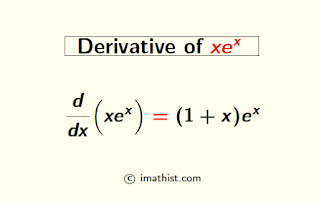The derivative of xex is equal to (1+x)ex. In this post, we will find the derivative of xex by the first principle and by the product rule of derivatives.

The first principle of derivatives says that the derivative of a function f(x) is given by the following limit formula:
$\dfrac{d}{dx}(f(x))$ $=\lim\limits_{h \to 0} \dfrac{f(x+h)-f(x)}{h}$ $\cdots (\star)$
Derivative of xex by First Principle
We will put f(x)=xex in the above formula $(\star)$. By doing so the derivative of xex by the first principle, that is, by the limit definition is given as follows:
$\dfrac{d}{dx}(xe^x)$ $=\lim\limits_{h \to 0} \dfrac{(x+h)e^{x+h}-xe^x}{h}$
$=\lim\limits_{h \to 0}$ $\dfrac{xe^{x+h}+he^{x+h}-xe^{x}}{h}$
$=\lim\limits_{h \to 0}$ $[\dfrac{xe^{x+h}-xe^{x}}{h}$ $+\dfrac{he^{x+h}}{h}]$
$=\lim\limits_{h \to 0}$ $\dfrac{xe^{x}e^{h}-xe^{x}}{h}$ $+\lim\limits_{h \to 0} e^{x+h}$
$=xe^{x} \lim\limits_{h \to 0}$ $\dfrac{e^{h}-1}{h}$ $+e^{x+0}$
$=xe^{x} \cdot 1 +e^{x}$ as we know that the limit of $(e^t-1)/t$ is 1 when t tends \to 0.
= xex +ex
= (1+x)ex.
Hence, the derivative of xex from the first principle is (1+x)ex.
Derivative of xex by Product Rule
Let us first recall the product rule of derivatives: If $f(x) = g(x) h(x)$ is a product of two functions, then the derivative of $f(x)$ is given by the rule below:
$\dfrac{d}{dx}[f(x)]$ $=g(x) \dfrac{d}{dx}[h(x)]+h(x) \dfrac{d}{dx}[g(x)]$
We have $f(x)=xe^{-x}$. So we put $g(x)=x$ and $h(x)=e^{x}$.
Hence, the derivative of $f(x)=xe^{x}$ by the product rule is given by
$\dfrac{d}{dx}(xe^{x})$ $=x \dfrac{d}{dx}(e^{x})+e^{x} \dfrac{d}{dx}(x)$
$=-xe^{x}+e^{x}\cdot 1$
= (1+x)ex.
Therefore, the derivative of xex by the product rule is equal to (1+x)ex.